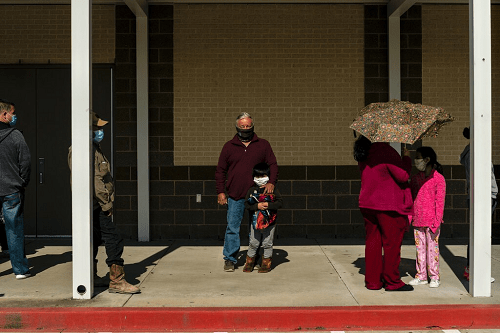
4.6.21 – NY Times
Under a new executive order issued by Gov. Greg Abbott of Texas this week, government agencies, private businesses and institutions that receive state funding cannot require people to show proof that they have been vaccinated against the coronavirus.
Mr. Abbott said that vaccination status is private health information, and that no one should have to disclose it as a condition of engaging in normal activities. His order includes an exception allowing nursing homes and similar care facilities to require documentation of vaccination status for their residents. Texas Coronavirus Map and Case Count
As the United States struggles to emerge from the worst public health crisis in a century, the arrival of digital vaccine verification apps — a modern version of the World Health Organization’s “yellow card” that provides international proof of yellow fever vaccination — has generated intense debate over whether proof of vaccination can be required at all.
A wide range of businesses, including cruise lines, airlines, sports stadiums and theaters, are eager for people to be issued some kind of credential, often called a vaccine passport, that they can present to show they are immunized so that the businesses can more safely reopen, especially as the number of new virus cases rises across the country.
Cathay Pacific airlines, for instance, convinced that digital proof of vaccination will bring about the return of safe international travel, asked its pilots and crew to try out a new mobile app that showed their vaccination status on a recent flight from Hong Kong to Los Angeles. But the World Health Organization, citing equity concerns, said on Tuesday that it currently did not support mandatory proof of vaccination for international travel.YOUR CORONAVIRUS TRACKER: We’ll send you the latest data for places you care about each day.Sign Up
And Walmart, the largest U.S. private employer, is offering electronic verification apps to patients vaccinated in its stores so they “can easily access their vaccine status as needed,” the company says.
At least 17 companies or nonprofits are developing websites or apps that might be used by sporting venues, restaurants and other businesses seeking to keep their customers and employees safe, according to Joel White, the executive director of the Health Innovation Alliance, a broad coalition of health providers, tech companies, employers and insurers.
Backers of digital vaccination cards are pressing the Biden administration to become involved, at least by setting standards for privacy and for verifying the accuracy of the records.
The White House is clearly skittish.
“The government is not now nor will we be supporting a system that requires Americans to carry a credential,” Jen Psaki, the White House press secretary, said on Tuesday. “There will be no federal vaccinations database and no federal mandate requiring everyone to obtain a single vaccination credential.”
Last week, the chief technology officer of the Department of Health and Human Services held a conference call with state and local health officials, who are mystified by the administration’s reticence.
“It’s going to be necessary to have this, and there is going to have to be some kind of system where it’s verified,” said Dr. Marcus Plescia, the chief medical officer of the Association of State and Territorial Health Officials. “I think everybody in our network is a little bit perplexed by the way the federal government seems to be at arm’s-length with this.”
Every state, in fact, already has a database, or an “immunization registry.” And under “data use agreements,” the states are required to share their registries with the C.D.C., though the agency de-identifies the information and not all states have agreed to provide it.
Politicians are already girding for a fight.
On Sunday, Gov. Tate Reeves of Mississippi said he opposes the idea of vaccine passports, and last week, Gov. Ron DeSantis of Florida issued an executive order banning policies that would require customers to provide any proof of vaccination. Gov. Pete Ricketts of Nebraska has said his state would not participate in any vaccine passport program.
The political and cultural divide aside, vaccine passports do raise daunting political, ethical and privilege questions.
In 1905, the Supreme Court ruled that states can enforce compulsory vaccination laws. “A community has the right to protect itself against an epidemic of disease which threatens the safety of its members,” Justice John Marshal Harlan wrote in Jacobson v. Massachusetts, the 1905 case. For more than a century, that ruling has allowed public schools to require proof of vaccinations of its students, with some exceptions for religious objections.
Private companies, moreover, are free to refuse to employ or do business with whomever they want, subject to just a few exceptions that do not include vaccination status. But states can probably override that freedom by enacting a law barring discrimination based on vaccination status.A HEATED DEBATERead more on the legal, ethical, political and ethical questions surrounding vaccine passports.
- Eileen Sullivan joined The Times in 2017 and covers news about the White House and Capitol Hill. Previously, she spent a decade at The Associated Press, where she and three other A.P. reporters won a Pulitzer Prize in 2012 for their work revealing the New York Police Department’s Muslim spying programs. @esullivannyt
- Adam Liptak covers the Supreme Court and writes Sidebar, a column on legal developments. A graduate of Yale Law School, he practiced law for 14 years before joining The Times in 2002. @adamliptak • Facebook
- Sheryl Gay Stolberg is a Washington Correspondent covering health policy. In more than two decades at The Times, she has also covered the White House, Congress and national politics. Previously, at The Los Angeles Times, she shared in two Pulitzer Prizes won by that newspaper’s Metro staff. @SherylNYT
